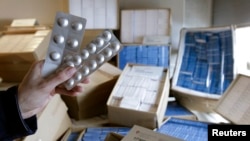DAKAR —
Liberia is cracking down on the sellers of fake or expired pharmaceutical drugs, but has met some resistance from people, especially in rural communities, who say these black market medicines are all they can get or afford. The traffic and sale of old and counterfeit medicine - a multimillion dollar industry - is widespread in West Africa.
It is not hard to find one of Liberia's roving drug salesmen known locally as "black bag doctors." John Harris walking down a county highway just a few kilometers outside the capital, Monrovia, where a VOA reporter met him.
He wore a backpack and carried a bucket. Both were full of unmarked plastic bags of pills that he said were painkillers and malaria drugs. Harris said this is not what he had in mind for his life when he graduated from medical school.
"How does the government expect us to survive when there is no job? So I do this, moving from villages and towns and sell these drugs to the people," Harris explained. "At least we are helping government. Some of the places we go, there are no health facilities. So I think we are a help."
But it is a crime to sell medicines in the street without a license. Inspectors from Liberia's Pharmaceutical Board have been combing the countryside looking for drug peddlers like Harris this year.
Chief Pharmacist Reverend Tijli Tarty Tyee said the pills and treatments these peddlers sell are expired, damaged by sun or humidity, or just fake.
"Medicines sold in this manner will not have the basic ingredients that will bring about cures and as a result of that," Tyee explained, "people taking the medicines, there is a potential of having microbial resistance to the medicines. When we have resistance to our imported medication, then we are in a very serious, serious situation."
He said he understands that people need medicines and they need them cheap.
"They want to have a shortcut in getting medicines but that shortcut is dangerous to them," Tyee said.
The crackdown has met some resistance from local communities and from the peddlers themselves. Tyee says inspectors have been injured during "raids."
It is harder to go after the source.
The U.N. Office on Drugs and Crime says fraudulent medicines in West Africa are both imported and manufactured locally.
It's a diffuse supply chain with limited government oversight. Flour has been discovered packaged as the antibiotic amoxicillin. Manufacturers try to raise profit margins by reducing the amount of an active ingredient. Or real medicines can make their way into a street peddler's backpack once they are past their expiration date.
Experts say the true scope of the problem is near impossible to measure.
The UNODC says even legitimate providers in West Africa, like pharmacists and doctors, can not be 100 percent sure that what they are administering is real.
It is not hard to find one of Liberia's roving drug salesmen known locally as "black bag doctors." John Harris walking down a county highway just a few kilometers outside the capital, Monrovia, where a VOA reporter met him.
He wore a backpack and carried a bucket. Both were full of unmarked plastic bags of pills that he said were painkillers and malaria drugs. Harris said this is not what he had in mind for his life when he graduated from medical school.
"How does the government expect us to survive when there is no job? So I do this, moving from villages and towns and sell these drugs to the people," Harris explained. "At least we are helping government. Some of the places we go, there are no health facilities. So I think we are a help."
But it is a crime to sell medicines in the street without a license. Inspectors from Liberia's Pharmaceutical Board have been combing the countryside looking for drug peddlers like Harris this year.
Chief Pharmacist Reverend Tijli Tarty Tyee said the pills and treatments these peddlers sell are expired, damaged by sun or humidity, or just fake.
"Medicines sold in this manner will not have the basic ingredients that will bring about cures and as a result of that," Tyee explained, "people taking the medicines, there is a potential of having microbial resistance to the medicines. When we have resistance to our imported medication, then we are in a very serious, serious situation."
He said he understands that people need medicines and they need them cheap.
"They want to have a shortcut in getting medicines but that shortcut is dangerous to them," Tyee said.
The crackdown has met some resistance from local communities and from the peddlers themselves. Tyee says inspectors have been injured during "raids."
It is harder to go after the source.
The U.N. Office on Drugs and Crime says fraudulent medicines in West Africa are both imported and manufactured locally.
It's a diffuse supply chain with limited government oversight. Flour has been discovered packaged as the antibiotic amoxicillin. Manufacturers try to raise profit margins by reducing the amount of an active ingredient. Or real medicines can make their way into a street peddler's backpack once they are past their expiration date.
Experts say the true scope of the problem is near impossible to measure.
The UNODC says even legitimate providers in West Africa, like pharmacists and doctors, can not be 100 percent sure that what they are administering is real.








